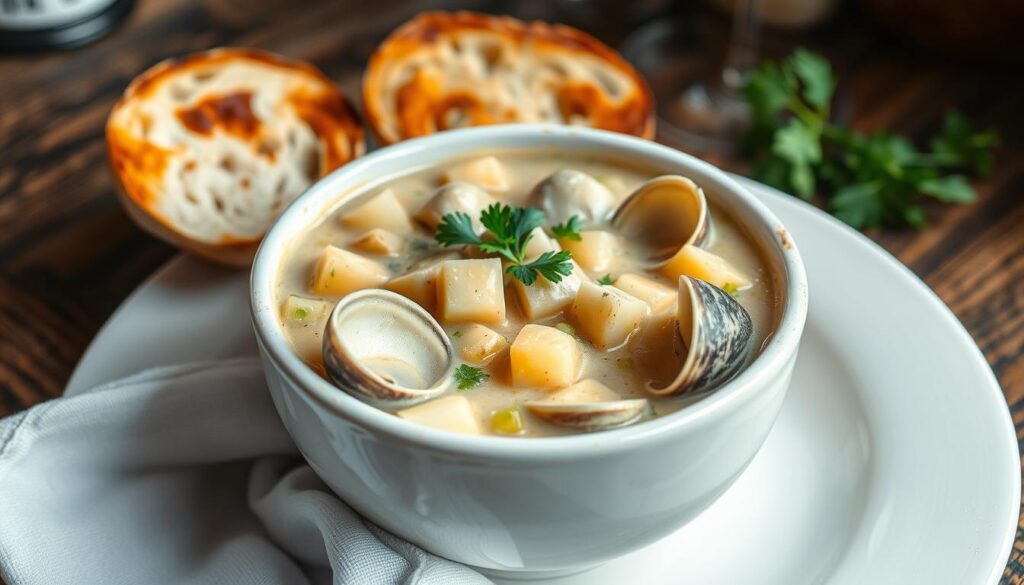Dive into the rich and comforting world of homemade New England Clam Chowder. This classic seafood soup has been loved in the region for generations. It combines fresh clams, creamy broth, and hearty vegetables perfectly. Whether you’re a seasoned chef or a home cook, this guide will help you make the perfect homemade clam chowder. You’ll capture the authentic flavors of the New England coastline.
Key Takeaways
- Discover the rich history and regional variations of New England Clam Chowder.
- Understand the essential ingredients and kitchen tools needed to make authentic clam chowder.
- Learn the step-by-step process for preparing fresh clams and creating the perfect creamy base.
- Explore serving suggestions and pairings to enhance the dining experience.
- Gain tips for achieving the ideal consistency and properly storing and reheating your chowder.
The Rich History of New England Clam Chowder
New England clam chowder is a beloved dish with deep roots in the region. It traces back to Colonial America’s early days. This creamy soup has grown over generations, showing New England’s culinary spirit.
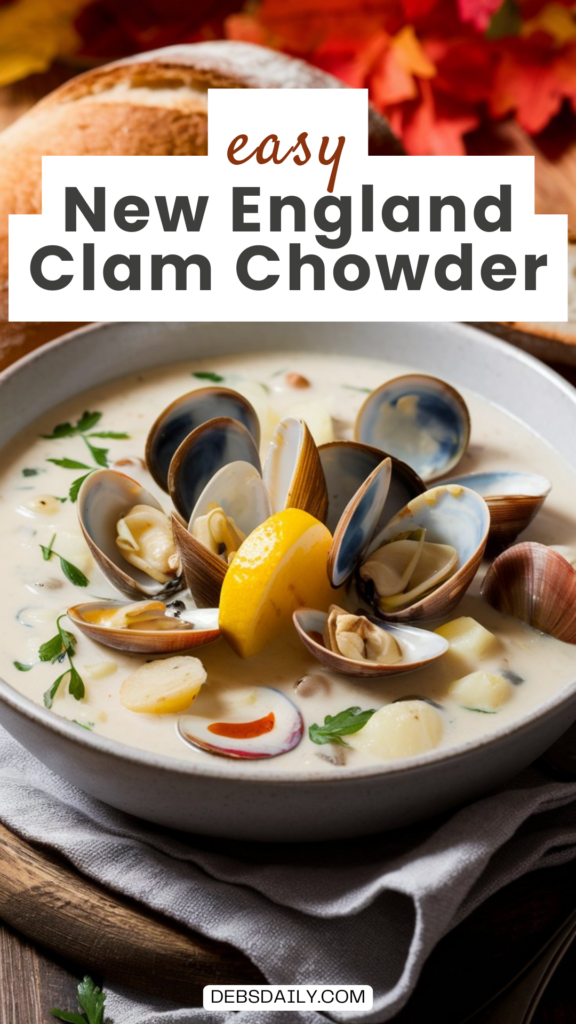
Origins in Colonial America
The first clam chowders came from New England’s coastal areas in the 17th and 18th centuries. European settlers used local clams in their cooking. This started the journey to the iconic New England clam chowder we love today.
Evolution Through Generations
The clam chowder recipe has changed over time. It reflects the tastes and trends of each era. New ingredients like potatoes and onions were added, making it richer. This evolution has led to many regional flavors, each unique.
Regional Variations
Clam chowder stays the same in New England, but each area has its twist. Manhattan-style has tomatoes, while Rhode Island’s is clear. These differences show the Northeast’s diverse culture and culinary creativity.
Today, New England clam chowder is celebrated by all. It’s a symbol of the region’s culinary spirit. From its beginnings to now, its history is a testament to New England’s enduring love for food.
Essential Ingredients for Authentic Clam Chowder
Making a great New England clam chowder is more than just mixing ingredients. It’s about choosing and preparing each part carefully. From the fresh clam chowder ingredients to the creamy broth, every piece is key to the East Coast’s authentic taste.
The heart of this soup is fresh clams. They add a tender texture and a salty-sweet flavor. The salt pork brings a smoky, savory taste that’s unique.
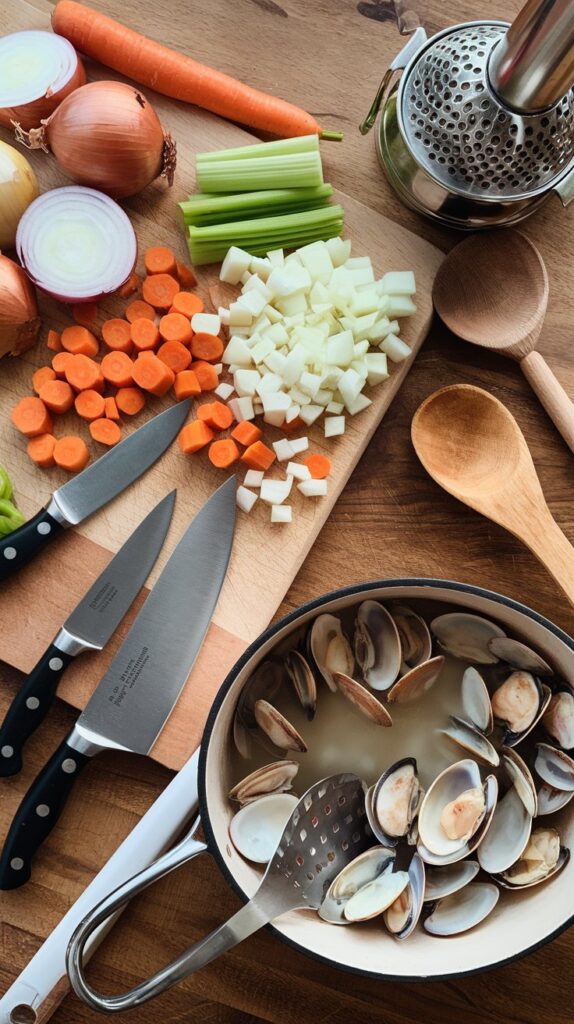
Potatoes are also crucial. They make the chowder thick and balance the salty taste. With heavy cream or half-and-half, they make the chowder creamy.
While these ingredients are must-haves, you can also add your own twist. Onions, celery, and carrots add more flavor. Some recipes even include bacon or sherry for extra depth.
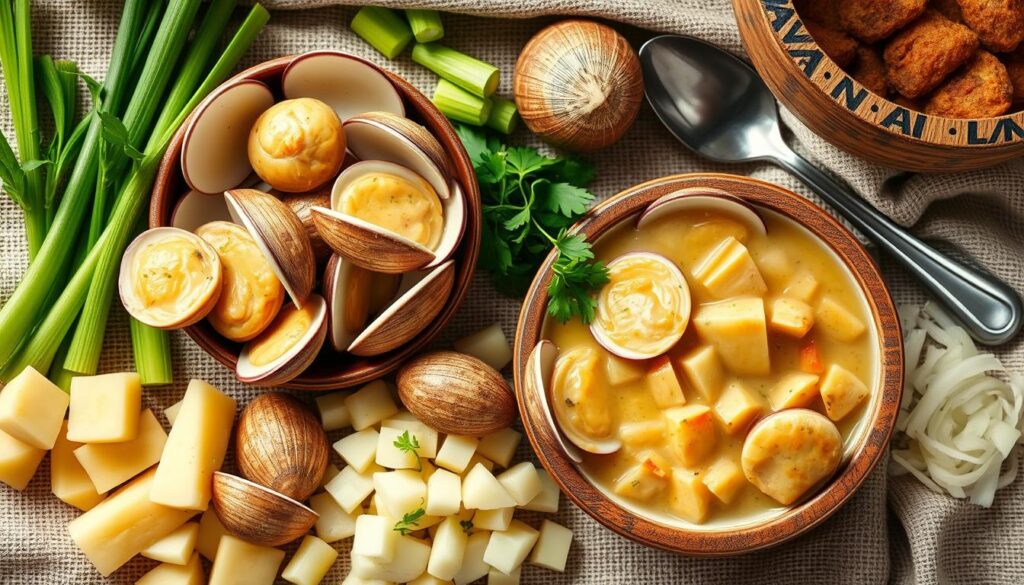
To make a true New England clam chowder, find the perfect mix of salty, creamy, and savory. With the right clam chowder ingredients, you’ll have a delicious bowl of this classic dish.
Kitchen Tools and Equipment Needed
Making the perfect New England clam chowder needs the right kitchen tools. You’ll need a good soup pot and special utensils. The right cookware helps get the creamy texture and rich flavor you want.
Must-Have Cookware
A heavy-bottomed soup pot or Dutch oven is key. It cooks evenly, avoiding scorching. Also, a clam chowder cookware set with ladle and bowls makes cooking easier.
The Lodge 6-quart Dutch Oven is a durable, enameled cast iron essential that combines timeless de...
Helpful Utensils and Gadgets
- Sharp kitchen knives for chopping veggies fast
- A potato masher or ricer for the right chowder texture
- A wooden spoon for stirring and scraping the pot
- A slotted spoon for moving clams from broth
Serving Essentials
For a better dining experience, serve in soup bowls or bread bowls. Add oyster crackers or a baguette for a New England touch.
| Kitchen Gadget | Purpose |
|---|---|
| Heavy-Bottomed Soup Pot | Ensures even heat for the perfect chowder texture |
| Potato Masher | Creates the creamy chowder consistency |
| Slotted Spoon | Transfers clams gently from broth |
| Soup Bowls or Bread Bowls | Offers a classic, appealing way to serve |
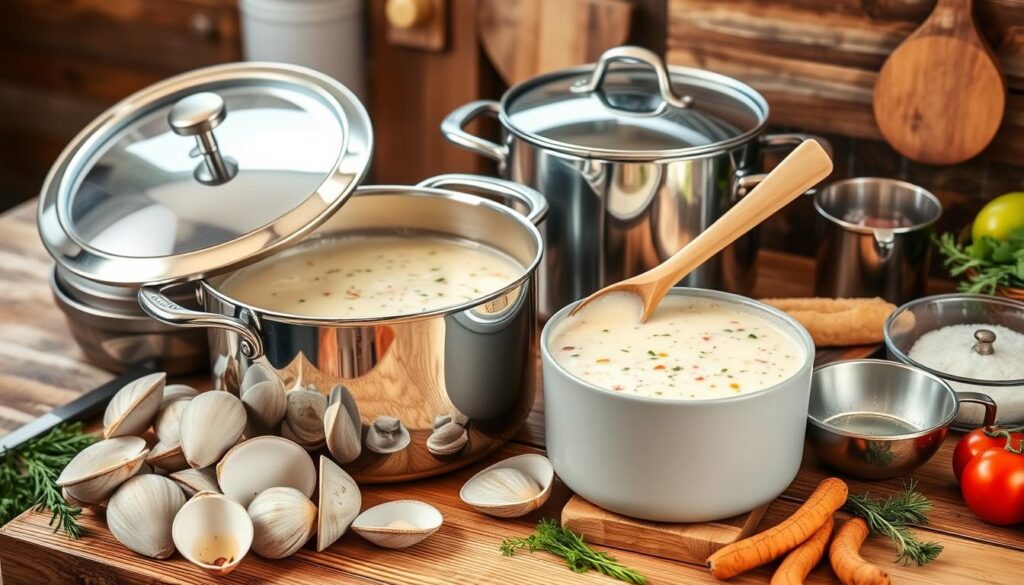
“The right tools can make all the difference in the kitchen, especially when preparing a beloved dish like New England clam chowder.”
Selecting and Preparing Fresh Clams
Starting with the best clams is key to a great clam chowder. When picking fresh clams, look for a few important things. This includes choosing the right types and learning how to clean and prepare them. We’ll show you how to get the best clams for your dish.
Sourcing the Freshest Clams
The quality of your clams makes a big difference in your chowder. Choose fresh clams that are tightly shut and have a shiny shell. Stay away from any with cracks, chips, or a bad smell. It’s best to buy them from a trusted seafood market or fishmonger on the day you plan to cook.
Cleaning and Preparing Clams
- Rinse the fresh clams under cold water, scrubbing them gently to remove sand or grit.
- Throw out any clams that are open and won’t close when tapped.
- Put the cleaned clams in cold water for 30 minutes to an hour. This helps them get rid of any sand or impurities.
- After they’ve purged, the clams are ready to use in your chowder.
| Clam Variety | Characteristics | Best Uses |
|---|---|---|
| Littlenecks | Small, sweet, and tender | Raw on the half shell, steamed, or in chowder |
| Cherrystones | Medium-sized, with a slightly salty, briny flavor | Steamed, in chowder, or used for stuffing |
| Top Necks | Larger than littlenecks, with a more pronounced flavor | Steamed, in chowder, or used for baking and stuffing |
By following these steps for selecting and preparing fresh clams, you’ll make a chowder that’s full of New England flavor.
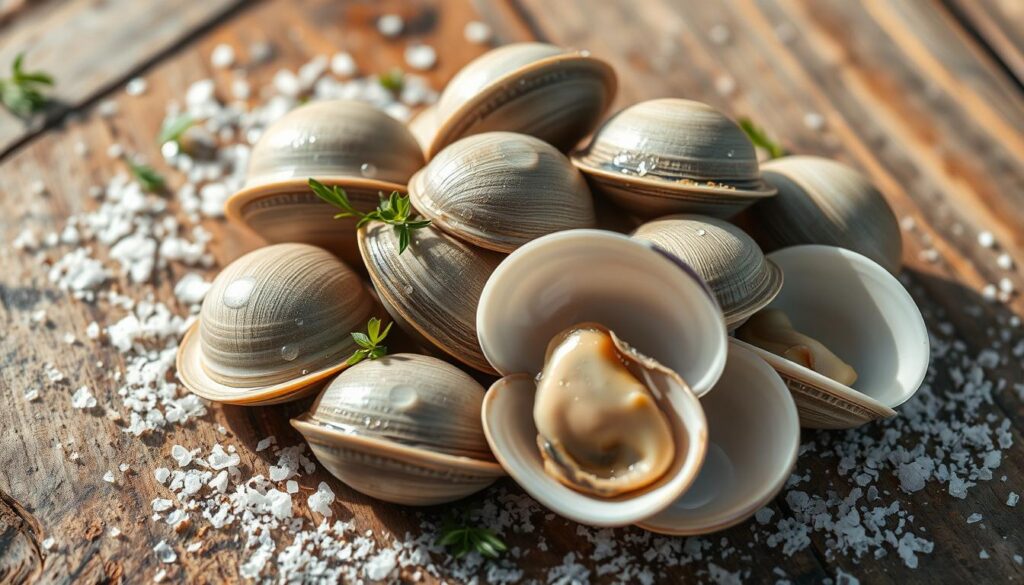
Classic Clam Chowder Recipe
Get ready for a tasty adventure with our clam chowder recipe. This guide is perfect for both experienced cooks and beginners. You’ll learn to make a creamy, delicious homemade soup that feels like a trip to New England.
Base Preparation
The key to a great clam chowder starts with the base. Start by cooking diced bacon until it’s crispy. Then, take the bacon out, keeping the fat in the pot. Next, cook diced onions, celery, and potatoes in the bacon fat until they’re soft and smell good.
Cooking Process
- Add clams, whether fresh or canned, to the pot. Let them simmer until they’re fully cooked.
- Then, mix in a creamy broth. This is made by whisking together milk, heavy cream, and a roux of butter and flour.
- Finally, add the reserved bacon. This lets the flavors mix well together.
Final Touches
Season the creamy seafood dish with salt, pepper, and a bit of thyme or bay leaf. This boosts the flavor. Let the chowder simmer until it’s the right consistency. Stir it now and then to avoid sticking or burning.
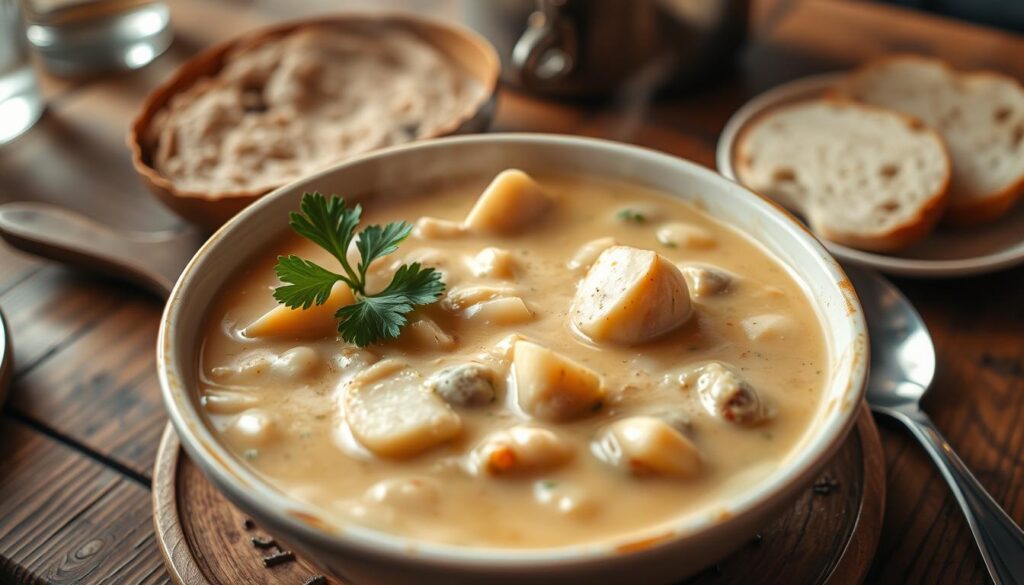
“The secret to a top-notch clam chowder recipe is finding the right balance of flavors and textures. This makes the dish both harmonious and comforting.”
Follow these easy steps to make a clam chowder recipe that will wow everyone. Enjoy the rich, creamy taste and feel like you’re in New England with every spoonful.
Tips for Achieving Perfect Consistency
Making the perfect thick clam chowder is about getting the consistency right. It’s all about balancing the creamy soup texture with hearty ingredients. Here are some tips to help you get it just right every time.
Mastering the Roux Technique
The roux, made from flour and fat, is key to thickening the chowder. It’s important to cook the roux until it smells nutty. This ensures it blends well with the broth.
Adjusting the Liquid-to-Solids Ratio
Getting the right mix of liquid and solids is crucial. Start with lots of broth, then add clams, potatoes, and veggies. Keep tasting and adjusting until it’s just right.
Simmering for the Right Duration
Patience is key when making thick clam chowder. Let it simmer long enough for the starches to gelatinize. This makes the soup creamy. Stir occasionally to keep it smooth.
Follow these tips to make a thick clam chowder that will wow your guests. Enjoy the creamy soup texture and the rich flavors from a well-made roux technique.
Serving Suggestions and Pairings
New England clam chowder is a classic that deserves great sides. From traditional choices to new ideas, we’ll find the best pairings for your chowder.
Traditional Accompaniments
A crusty bread bowl or buttery oyster crackers are perfect for dipping. They add a nice texture and soak up the broth. For a fuller meal, try it with a fresh green salad or coleslaw to cut the richness.
Modern Serving Ideas
- Add crispy bacon bits, chopped chives, or paprika on top for flavor and looks.
- Use mini bread bowls or sourdough bread bowls for a fun twist.
- Pair it with grilled cheese sandwiches or crusty garlic bread for a cozy meal.
Wine Pairing Recommendations
Choosing wine for wine with seafood like clam chowder is fun. Try a crisp Sauvignon Blanc or creamy Chardonnay for a good match. For something bolder, go for a light Pinot Grigio or dry Riesling. Experiment to find your favorite soup pairings.
| Wine Varietal | Flavor Profile | Complementary Notes |
|---|---|---|
| Sauvignon Blanc | Crisp, refreshing, with citrus and herbal notes | Balances the creaminess of the chowder |
| Chardonnay | Creamy, with notes of oak and vanilla | Complements the rich and buttery flavors |
| Pinot Grigio | Light-bodied, with subtle fruit flavors | Provides a refreshing contrast to the chowder |
| Riesling | Dry, with floral and stone fruit notes | Balances the saltiness of the seafood |
“The key to a perfect clam chowder pairing is finding a wine that can stand up to the bold, briny flavors while still complementing the creamy texture.”
Storage and Reheating Guidelines
Keeping your New England clam chowder delicious is key. Follow these easy tips for storing and reheating your leftovers.
For a few days, store your chowder in the fridge. Use an airtight container to keep flavors and texture fresh. To reheat, warm it on the stovetop over medium heat, stirring often.
For longer storage, freeze your chowder for up to 3 months. Use freezer-safe containers or bags, leaving space for expansion. Thaw overnight in the fridge, then reheat on the stovetop, stirring often to keep it creamy.
FAQ
What makes New England Clam Chowder unique?
New England Clam Chowder is known for its creamy broth and fresh clams. It uses salt pork, potatoes, and heavy cream. This mix gives it a special taste that’s different from other chowders.
What are the essential ingredients in an authentic New England Clam Chowder?
Traditional New England Clam Chowder needs fresh clams, salt pork or bacon, and onions. It also includes potatoes, heavy cream, and seasonings like thyme and black pepper.
How do I choose and prepare the fresh clams for my chowder?
Choose clams that are closed tightly and look good. Clean and scrub them well. Steam or simmer the clams to get their juices for your chowder.
What techniques can I use to achieve the perfect creamy consistency?
To get the creamy texture, you can make a roux or purée some potatoes. Adding cornstarch or flour slurry helps too. Adjusting the broth and dairy mix also affects the texture.
What are some traditional accompaniments and serving suggestions for New England Clam Chowder?
Clam chowder goes well with crusty bread or oyster crackers. Try it with a green salad, pickled veggies, and a dollop of sour cream or bacon.
How can I store and reheat leftover clam chowder?
Store leftover chowder in an airtight container in the fridge for 3-4 days. Reheat it gently over low heat, stirring often. You can also freeze it for up to 3 months, thawing it in the fridge before reheating.

